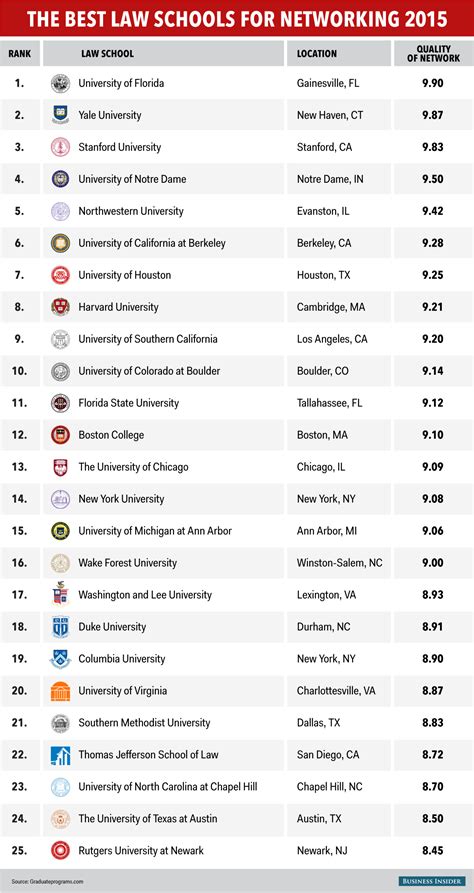Aspiring lawyers seeking a top-notch legal education have a wealth of choices in the United States. Here are the most distinguished law schools, renowned for their academic excellence, prestigious faculties, and impressive career outcomes.

Top 10 Law Schools in the U.S.
- Yale Law School (New Haven, CT)
- Stanford Law School (Stanford, CA)
- Harvard Law School (Cambridge, MA)
- Columbia Law School (New York, NY)
- University of Chicago Law School (Chicago, IL)
- New York University School of Law (New York, NY)
- University of Pennsylvania Law School (Philadelphia, PA)
- University of California, Berkeley School of Law (Berkeley, CA)
- University of Virginia School of Law (Charlottesville, VA)
- Cornell Law School (Ithaca, NY)
Admission and Academics
Admission to these elite law schools is highly competitive, with acceptance rates typically below 10%. Applicants must possess exceptional academic achievements, strong extracurricular activities, and a compelling personal statement.
The curriculum at these institutions is rigorous and comprehensive, covering a wide range of legal subjects from Constitutional Law to Corporate Law. Students engage in thought-provoking discussions, analyze complex case studies, and develop their legal writing and analytical skills.
Faculty and Research
The faculties of these law schools are composed of renowned legal scholars, experienced practitioners, and influential judges. They contribute to the advancement of legal theory and practice through their groundbreaking research and publications.
Career Outcomes
Graduates of these prestigious law schools enjoy exceptional career prospects. They are sought after by top law firms, government agencies, and non-profit organizations. According to the National Law Journal, Yale Law School had the highest percentage (41.9%) of graduates employed at top law firms in 2021.
Factors to Consider When Choosing a Law School
- Location: Consider the location of the school and its proximity to legal markets of interest.
- Curriculum: Research the curriculum and course offerings to ensure alignment with your interests and career aspirations.
- Faculty: Explore the faculty’s credentials, research areas, and teaching styles.
- Career Services: Evaluate the school’s career services office, job placement rates, and alumni network.
- Diversity and Inclusion: Consider the school’s commitment to diversity, equity, and inclusion in its student body, faculty, and administration.
- Cost and Financial Aid: Determine the cost of attendance and explore financial aid options, scholarships, and grants.
Tips and Tricks
- Start preparing early: Begin your law school application process early to allow ample time for research, writing, and test preparation.
- Seek mentorship: Connect with a mentor or advisor who can provide guidance and support throughout the application process.
- Network with admissions representatives: Attend law school forums and connect with admissions representatives to learn more about their programs.
- Write a compelling personal statement: Share your unique experiences, motivations, and aspirations in a well-crafted personal statement.
- Prepare thoroughly for the LSAT: Dedicate sufficient time to studying for the Law School Admission Test (LSAT) and aim for a competitive score.
Pros and Cons of Attending a Top Law School
Pros:
- Prestigious reputation and academic excellence
- Access to renowned faculty and research opportunities
- Exceptional career prospects and job placement rates
- Strong alumni network and career support
Cons:
- Highly competitive admission process
- Expensive tuition and cost of living
- Rigorous workload and demanding academic environment
- Potential for a large class size and lack of individualized attention
Frequently Asked Questions
1. What are the key differences between the top law schools?
The top law schools vary in terms of their curriculum, faculty, career outcomes, and geographic location. Yale Law School is known for its focus on legal theory and international law, while Stanford Law School emphasizes Silicon Valley and technology law.
2. How can I improve my chances of admission to a top law school?
Maintain a high GPA, score well on the LSAT, participate in extracurricular activities, and write a compelling personal statement. Consider seeking mentorship and building relationships with law school admissions representatives.
3. What are the career options for law school graduates?
Law school graduates can pursue careers in various fields, including litigation, corporate law, government, public interest law, and academia. They can work as attorneys, judges, legal advisors, or policy analysts.
4. How much does law school cost?
Tuition costs at top law schools can range from $60,000 to $80,000 per year. Additional expenses include living expenses, books, and fees. Financial aid is available in the form of scholarships, grants, and loans.
5. What is the job market for law school graduates?
The job market for law school graduates is competitive, but strong for graduates of top law schools. According to the National Association for Law Placement (NALP), the median starting salary for law school graduates employed at large law firms in 2021 was over $200,000.
6. How do I choose the best law school for me?
Carefully consider your interests, career aspirations, and financial situation. Research different law schools, visit their campuses, and connect with current students and alumni to make an informed decision that aligns with your goals.
Additional Resources
- American Bar Association: https://www.americanbar.org/groups/legal_education/resources/law_schools/
- U.S. News & World Report: https://www.usnews.com/best-graduate-schools/top-law-schools
- Princeton Review: https://www.princetonreview.com/law-school-rankings/best-law-schools
- National Law Journal: https://www.nationallawjournal.com/nlj500
- Law School Admission Council: https://www.lsac.org/
Conclusion:
Choosing the right law school is a crucial decision that can significantly impact your legal career. By thoroughly researching your options, considering your priorities, and seeking guidance from mentors and professionals, you can make an informed decision that will help you achieve your legal aspirations.
